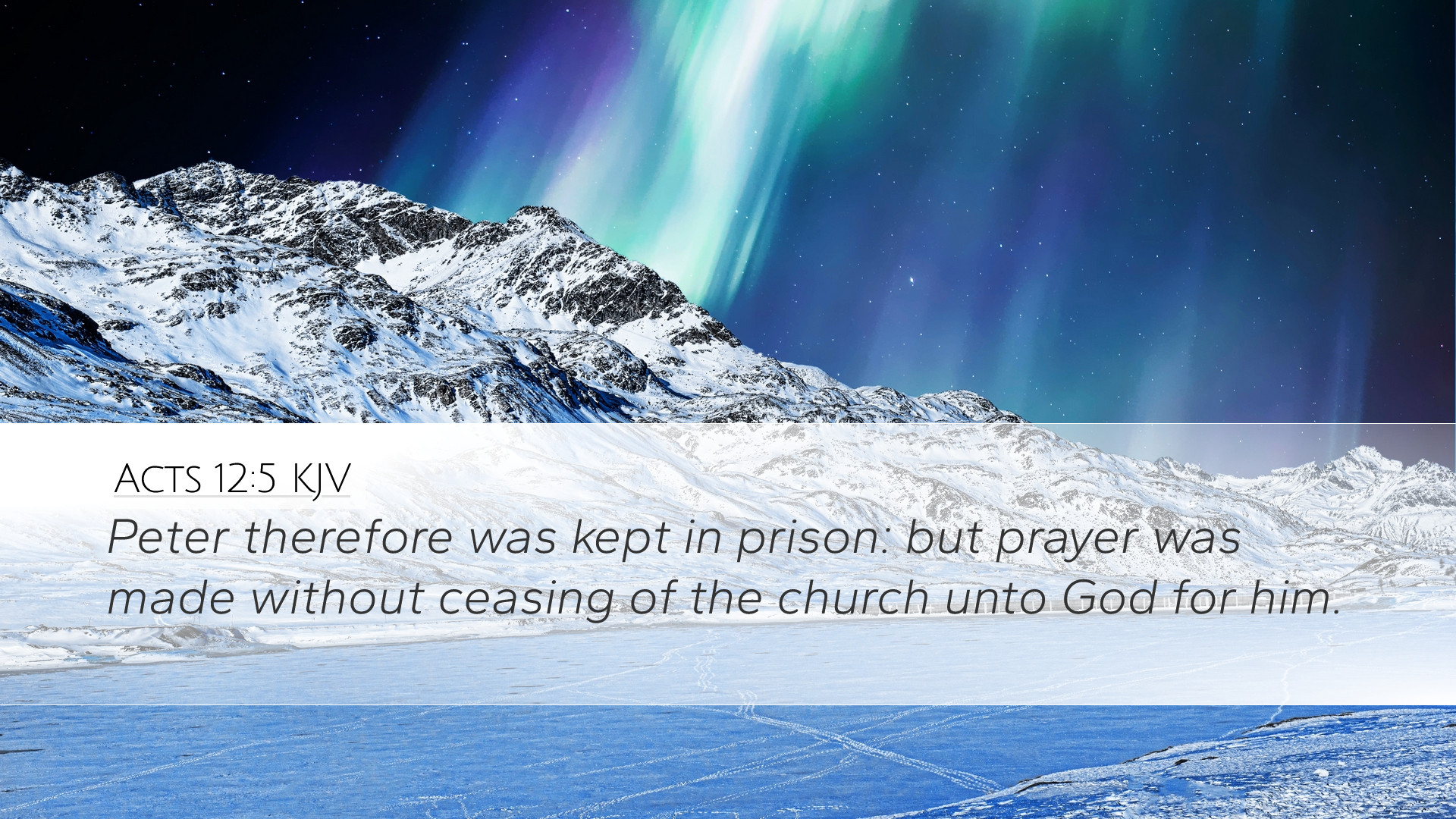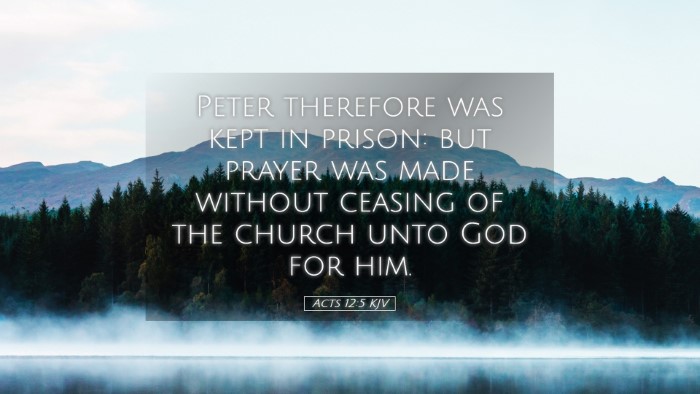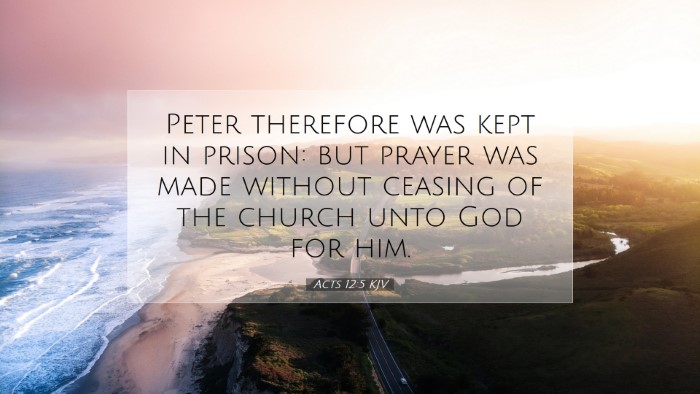Old Testament
Genesis Exodus Leviticus Numbers Deuteronomy Joshua Judges Ruth 1 Samuel 2 Samuel 1 Kings 2 Kings 1 Chronicles 2 Chronicles Ezra Nehemiah Esther Job Psalms Proverbs Ecclesiastes Song of Solomon Isaiah Jeremiah Lamentations Ezekiel Daniel Hosea Joel Amos Obadiah Jonah Micah Nahum Habakkuk Zephaniah Haggai Zechariah MalachiActs 12:5
Acts 12:5 KJV
Peter therefore was kept in prison: but prayer was made without ceasing of the church unto God for him.
Acts 12:5 Bible Commentary
Commentary on Acts 12:5
Acts 12:5: "Peter therefore was kept in prison: but prayer was made without ceasing of the church unto God for him."
This verse encapsulates a critical moment in the early Church, illustrating the interplay between the human condition and divine intervention, serving as a potent reminder of the power of collective spiritual endeavor.
Contextual Analysis
In the context of Acts 12, the Church faces severe persecution from King Herod. Peter is imprisoned, and the threat of execution looms large. This situation illustrates the vulnerability of the early Christians and the external pressures threatening the progress of the Gospel.
Insights from Public Domain Commentaries
Matthew Henry's Commentary
Devoted Prayer: Matthew Henry emphasizes the Church's unwavering commitment to prayer. Despite Peter's dire circumstances, the church engages in unceasing prayer, showcasing their belief in God's power to intervene.
The Nature of Prayer: Henry points out that the prayer was made without ceasing. This repetition highlights both persistence and collective action, indicating that prayer was not a one-time event but an ongoing communal activity, reflecting their deep reliance on God.
Confidence in God's Sovereignty: The Church's constant prayer indicates their understanding that Peter's fate was ultimately in God’s hands. Henry notes that their commune in prayer was their way of asserting faith in God’s sovereignty over their hostile situation.
Albert Barnes' Notes on the Bible
Imprisonment vs. Divine Help: Barnes contrasts Peter's imprisonment with the church's fervent prayer. He points out that while Peter was in a seemingly hopeless situation, the active prayer of the church serves as a testament to the power of faith. It signifies that circumstances do not limit God's ability to act.
Prayer as Power: Barnes emphasizes the effectiveness of prayer. He interprets the church's response as a model for all believers. This verse reiterates the notion that prayer can affect outcomes, often leading to miraculous interventions.
Unity in Supplication: Barnes highlights the communal aspect of prayer. The early Christians banded together for Peter, reflecting the Church’s unity and shared purpose. This model encourages churches today to engage in collective prayer, particularly in times of crisis.
Adam Clarke's Commentary
Your Prison May Not Be a Physical Cell: Clarke elaborates that Peter's imprisonment is a metaphorical representation of the trials faced by believers. He notes that believers today may also find themselves imprisoned by various life circumstances, be it sin, despair, or societal pressures.
Essence of Faithful Community Prayer: Clarke draws attention to the fervency of the church’s prayer, suggesting that this intensity is vital for spiritual breakthroughs. True prayer requires not just words but a heart aligned with God’s will and an energetic intent.
The Position of Expectancy: Clarke invites readers to consider the anticipation imbued in their prayers. He suggests that the church had an expectant faith; they believed God would respond, which is crucial in the life of a believer. It raises the question: do we pray with anticipation of God’s response?
Theological Implications
This passage embodies several theological themes that resonate deeply with the believer’s experience:
- The Struggle Between Good and Evil: The opposition Peter faced underlines the reality of spiritual warfare, continuing to be relevant today.
- The Efficacy of Prayer: This text serves as a foundational principle for understanding the power of prayer in the believer’s life, suggesting that intercessory prayer is a vital aspect of community solidarity.
- Faith in Providence: The unwavering prayer signifies a profound trust in divine providence, reassuring believers that God's plans prevail regardless of visible circumstances.
Application for Today’s Believers
Acts 12:5 calls contemporary believers to reflect on their own prayer lives and challenges:
- Engagement in Communal Prayer: Just as the early church gathered to pray, modern congregations should prioritize corporate prayer as a means of fostering community and shared faith.
- Persist in Faith: In difficult situations, this verse encourages believers to remain steadfast and persistent in their prayers, trusting that God hears and responds in His timing.
- Be Expectant: Engage in prayer with the expectation that God will act. This anticipation transforms the act of prayer into a dynamic interaction with the Divine.
Conclusion
Acts 12:5 serves as a compelling reminder of the role of prayer in the believer’s life and the importance of community support in times of distress. The commentary from respected theologians reminds us of the necessity of a fervent prayer life characterized by perseverance and unity. This passage invites believers to recognize that while earthly troubles may abound, the power of prayer can effectuate divine results, encouraging faith in a God who listens and acts.


